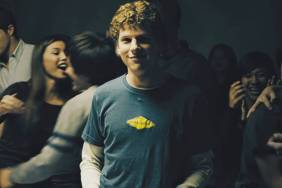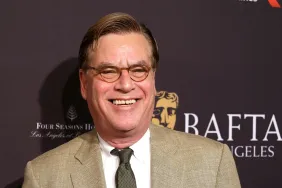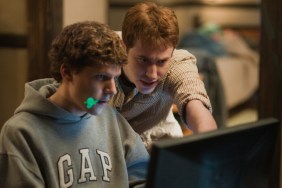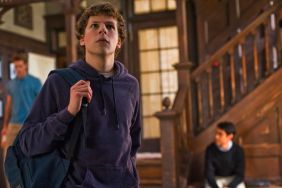Cast:
Jesse Eisenberg as Mark Zuckerberg
Andrew Garfield as Eduardo Saverin
Justin Timberlake as Sean Parker
Armie Hammer as Cameron and Tyler Winklevoss
Max Minghella as Divya Narendra
Brenda Song as Christy Lee
Rooney Mara as Erica Albright
Rashida Jones as Marylin Delpy
Joseph Mazzello as Dustin Moskovitz
Malese Jow as Alice
John Getz as Sy
Liam Ferguson as Brian
Scott Lawrence as Maurice
Patrick Mapel as Chris Hughes
Caitlin Gerard as Ashleigh
John Hayden as Mr. Winklevoss
Directed by David Fincher
Story:
In 2003, Harvard junior Mark Zuckerberg (Jesse Eisenberg) was inspired to create “TheFacebook.com,” a site where Harvard students could interact with each other. Along with his best friend Eduardo Saverin (Andrew Garfield), who funded the venture, the site launches to huge success and continues to grow until the entry of Napster innovator Sean Parker (Justin Timberlake) and then everything begins to unravel.
Analysis:
Computer programmers, economics students and identical twin brothers on the Harvard rowing team may not seem like the ideal characters for an interesting film, but realizing this disparate group of characters were involved with the formation of Facebook and the resulting lawsuits borne from its success might make one think otherwise. Grated, after last month’s “Middle Men,” we deserve the right to be wary of any movie about internet pioneers, except that this is director David Fincher working from a screenplay by Aaron Sorkin… bitch.
That’s all that’s needed to separate “The Social Network” from being a run-of-the-mill play-by-play of what went down after Mark Zuckerberg created Facebook, instead being a unique film with so many layers it would be impossible to appreciate all of them in just one viewing.
“The Social Network” asks what it takes to create a monster, and not the stitched-together kind made famous by Frankenstein, but one of Mark Zuckerberg’s own making, a by-product of the genius that created the popular site Facebook which ultimately pushes his only friend away from him. Opening with a scene of Mark being dumped by his girlfriend Erica (Rooney Mara), you immediately get a sense of Sorkin’s sharp dialogue, which cuts so quickly back and forth between characters that it never allows the film’s momentum to lose steam. Mark’s a computer programming genius who has very little patience or tolerance for those who aren’t as smart as him, which is very few people, but his desire to get revenge on Erica has him hacking into Harvard’s mainframe, something that quickly gets him noticed. Anyone who has spent more than a few minutes on the internet has encountered people like Mark, smart but self-righteous people whose lack of social graces makes the internet the perfect place for them to shine.
We’re introduced to Marks’ best friend and fellow Harvard junior Eduardo Saverin, played by Andrew Garfield, during the lawsuit depositions that create a framing device for the non-linear structure the movie quickly takes on, which is also where we meet Cameron and Tyler Winklevoss, twin athletes who hire Mark to program their own Harvard-based dating site, which they allege inspired the idea for Facebook.
“The Social Network” is a fascinating departure for Fincher, since it’s not a film that gives him a lot of room to flex his flair for the visual as with earlier films. Instead, his direction is used solely to cater to Sorkin’s screenplay and the performances. There’s no denying this is the finest script of Sorkin’s already-prestigious career, ably telling a story whose very nature involves a lot of computer techno-babble, yet all the snappy rapid-fire interactions never distracts from the storytelling. The non-linear approach takes some adjusting to compared to the simpler, cleaner narrative of Ben Mezrich’s book “The Accidental Billionaires,” but Sorkin’s dialogue makes the many duplicated moments resonate.
As the film opens, it might seem like Jesse Eisenberg is approaching Mark similar to what we’ve seen him do before, as an awkward but likeable dweeb, but we quickly realize that this is not the case at all. Instead, Mark Zuckerberg is painted as a misogynist misanthrope, a completely unlikable ***hole who has no tolerance or patience for others, and Eisenberg delivers just the right degree of scowl for it to be very effective. If the story took place thirty years earlier, Zuckerberg may have picked up a guitar and started a punk band, but you also get the impression that if he weren’t using his programming genius to invent, he could have just as easily picked up a shotgun. Compared to the cold demeanor of everyone else in the film, Garfield’s Eduardo is far easier to relate to, making him the film’s protagonist by default with a number of strong emotional moments.
Roughly an hour into the film, we meet Sean Parker, the entrepreneur behind Napster, who jumps on board as Facebook starts to get big. It’s another momentous milestone in Mark’s journey, because he and Sean are clearly two of a kind, but it immediately creates a wedge in his friendship with Eduardo. It’s a role perfectly tailored to Justin Timberlake and he nails it every possible way, immediately taking the second half to another level as he inspires Sorkin to pull out the stops to create a classic film character. Sean’s influence over Mark makes you feel as if you’re watching a transformation similar to Lex Luthor losing his hair and becoming a full-on super-villain, yet by the end, you can’t help but feel sorry for Mark, which is a brilliant testament to what Fincher is able to pull from Eisenberg’s natural acting talent.
Even so, the most impressive thing about “The Social Network” is the way Sorkin, age 49, and Fincher, age 48, are able to capture the spirit of modern-day youth on campus and the programming community that creates the backdrop for what goes wrong once Facebook catches on.
The score by Trent Reznor and his Nine Inch Nails collaborator Atticus Ross is reminiscent of their “Ghosts” album. While it may seem like an odd choice at first, it greatly adds to the mood of the film, softening the frenetic pace of the dialogue without ever distracting from it.
The lack of female characters in Mezrich’s book is reflected in the movie, though in this case, the two women are crucial to Mark’s story despite brief appearances. Mark’s ex-girlfriend Erica becomes his inadvertent muse when her actions inspire him to create a site that makes him rich beyond his dreams. The brilliant opening scene is bookended by an equally important conversation between Mark with his attorney, played by Rashida Jones, that brings home how everything has affected Mark despite him being unable to show emotion. In that sense, it forces us to question whether Zuckerberg really is the monster we’ve been made to believe or just collateral damage of his own genius.
The Bottom Line:
“The Social Network” is a brilliantly layered film that examines the myriad façades of the Facebook story, not just from a technical or business standpoint, but also the emotional dissolution of a friendship when money becomes involved. It’s another home run for Fincher and about as close to perfection one can hope for with such a complex tale, as well as a film that pulls the rug out from under you emotionally.
The Social Network opens the 48th New York Film Festival on Friday, September 24, before opening nationwide on October 1.










